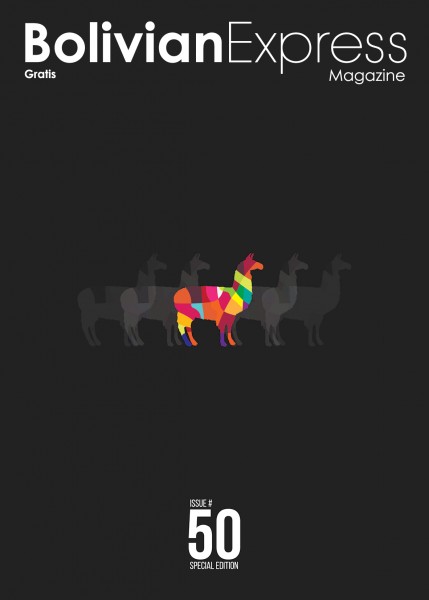
Five years ago Bolivian Express was born between a japanese restaurant and a lift on Avenida 20 de Octubre in La Paz. During the clunky journey from the ground floor to the 17th storey, two young gentlemen and a Swiss-Indian chica lamented the absence of an English-language publication in the country; two notable predecessors—the Bolivian Times and Llama Express—were sadly no longer in circulation. And so the name of the magazine was born as a portmanteau of sorts, an homage to the magazine’s forebearers.
We were determined to find a viable way of printing a quality free publication, given the erratic nature of local advertising revenues and shortage of local English-language journalists. A further (Irish) founder was enlisted and six university friends were boarded on a plane, kidnapped to serve as editorial guinea pigs. It became clear to the founding team that an ideal way of sustaining the project as a whole would be to combine it with a journalism training programme.
What started off as a magazine for tourists quickly turned into something else. After the first 10 issues, we had already covered all the well-trodden festivities and attractions the country is probably best known for. The continuous challenge has been to find new stories from which everyone, including the local audience, can learn something new. Indeed, over half of our readers are native Spanish speakers, so we are as committed to writing for them as we are for the uninitiated in Bolivia. This work has brought us close to people we would perhaps never have had an excuse to get to know: from former presidents, ministers and local sporting heroes, to Michael Jackson impersonators, prisoners serving life sentences and private investigators.
Since our unconventional beginnings, the project has involved over 120 people from 20+ countries worldwide who have come to volunteer as part of the effort.Today, the Bolivian Express team of volunteers live and sleep in a shared house as they explore the country, its stories and cultures with the help of a local team. By looking beyond the salt-flats and ancient ruins, their mission is to bring new eyes to this infinite land. If they leave as cultural ambassadors, rather than just tourists, the project has achieved one of its aims. And, of course, by flicking through these pages you, the reader, are closing the circle and helping to complete this project’s mission.
Over the years we have also worked with a large number of people across the world: editors scattered across San Francisco, New York and Caracas, a web developer in Berlin, an editor and marketing director somewhere in the Swiss alps, and even a virtual assistant in Bulgaria (hey, Pavlin). As past team members have taken on new challenges, others have appeared and have reshaped the project anew. With this, our 50th issue, we are incredibly proud to say that Bolivian Express has a life of its own; it exists as something greater and wiser than the people who have made it possible so far.
Thank you for being a part of this journey.
PHOTO: VALERIA WILDE
Christian Conitzer is a scientist, a cyclist and a dreamer who never lost sight of his goal: keeping the Marathon of La Paz alive. In 2012 and 2013, the first and second marathons of La Paz were organised by a cement manufacturer, Soboce, bringing together around 2000 runners each year. Running at 3600 meters above sea level on La Paz’s varied terrain, was a true privilege to those who were lucky enough to take part of the first two races. In 2014, the Marathon of La Paz was cancelled, mainly due to two reasons; Soboce was sold to Peruvian businessmen, who decided not to endorse the event; and local authorities did not grant permission for the most important race of the country to take place.
Faced with this situation, Conitzer was courageous enough to organise the marathon himself. He gained the support of several sponsors and advertised via Facebook and other means. In contrast to previous years, where the number of runners was in the thousands, in 2014, 157 people signed up and only 72 actually participated. Conitzer ended paying for the unused t-shirts and medals out if his own pocket.
With the help of some friends, Conitzer managed to mark every kilometre of the route, ensure that participants were kept hydrated, and even offer prizes to those finishing first.
The runners that took part in this third edition of the La Paz Marathon gave testament to the fact that it was an unforgettable experience and were very grateful to the organiser who, in spite of all the obstacles, accepted the challenge and gave rise to a true family of marathon-runners.
PHOTO: ALEXANDRA MELEAN
The Queen of Street Food, in spite of the grand variety of Street-bought snacks available in Bolivia, the salteña remains both a popular mid-morning snack and a food of celebrations. Whilst it originated in Tarija, created by a Salta-born woman moved to Bolivia, it is now the test of a true paceño. If you can eat one of these without the juices spilling everywhere, then this is where you truly belong.
PHOTO: JUAN MANUEL LOBATON
A Warcry, the gold and black, one passion, unyielding fans and one big heart that never goes cold, that never stops beating. This is what makes us different from them all. We are the first, we are The Strongest. Huarikasaya Kalatakaya… Hurra Hurra!

 Download
Download





















